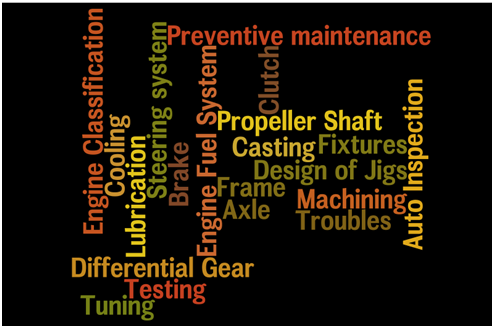

Featured AMCAT Module: Automotive Engineering
About the Module

The module on Automotive Engineering has been designed to assess a candidate on the understanding of the basic concepts taught during the four-year course in Automotive Engineering. It lays greater emphasis on the practical aspects during the course of study that encompasses topics right from analyzing automotive systems – their performance and/or redesigning parts, developing test procedures to approximating cost for automotive designs and analyzing production requirements.
Categorically placed under Vehicle Engineering, Automotive Engineering is an amalgamation of Mechanical, Electrical, Electronic and Safety Engineering and deals with the designing, manufacturing and operation of automobiles.
Students pursuing a course in Automotive Engineering are generally employed as a Development Engineers in an automation company. They are responsible for coordinating the delivery of engineering attributes of an automobile. Also, they need to ensure that they conform to the rules of the manufacturer, government and ultimately the customer who buys the product (automobile).
Apart from the responsibility of ensuring that the components and systems are functioning efficiently, Development Engineers play a role in the trade-off process i.e. delivering the automobile attributes at an acceptable level. A trade-off between fuel economy and engine performance could be considered as one such example.
I am an Automation Engineer. What am I supposed to do in the industry?
The job role of an Automation Engineer working in an automotive industry can be categorized into designing, research & development and production. Those involved in the design and development profiles are responsible for transforming ideas into blueprint by building and testing prototypes with the help of computer simulations – assessing component attributes like performance, strength and safety.
Those working in the production teams are involved in planning the production, redesigning tools and ensuring quality control.
Wide range of career options are available for Automotive Engineers, right from managing day-to-day engineering operations to a more strategic role that includes research, planning and developing new ideas. Automotive Engineers with several years of work experience might move into short-term projects on contractual basis, or start up their own business by establishing automotive design and engineering firms.
Tips to improve:
- Since an Automotive Engineer is usually working on engine systems, specifically electrical and control systems, they should have an in-depth knowledge of concepts of thermodynamics, aerodynamics and conceptual topics like fluid mechanics, fuel technology and emissions.
- A strong interest in vehicle and engineering design and knowledge of Computer-Aided-Design is a must to climb the ladder of success in the automotive industry.
- Automotive Engineers work in close teams, and therefore, they must communicate well, work as a team and take responsibility for the tasks assigned.
- They must be committed to keep themselves updated with the latest technology and must possess fairly good I.T skills.
- One can also subscribe to the newsletters and technical journals to keep a track of what’s going on in the automotive industry. This will not only be able to keep you updated about the latest happenings in the automotive world, but will also prepare you better for interviews.
- http://www.sae.org/, http://ae-plus.com/ - some useful websites for Automotive Engineers.




